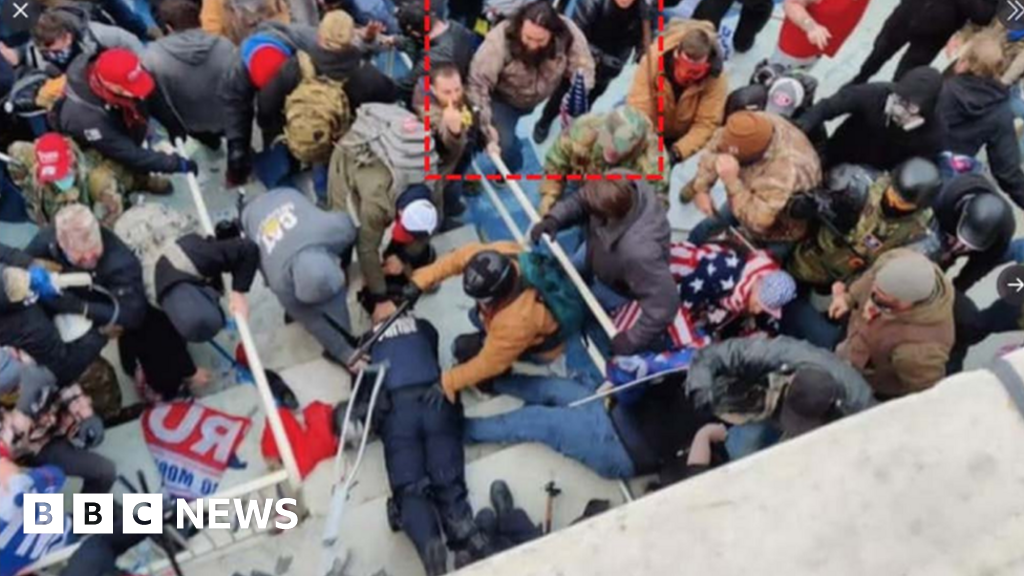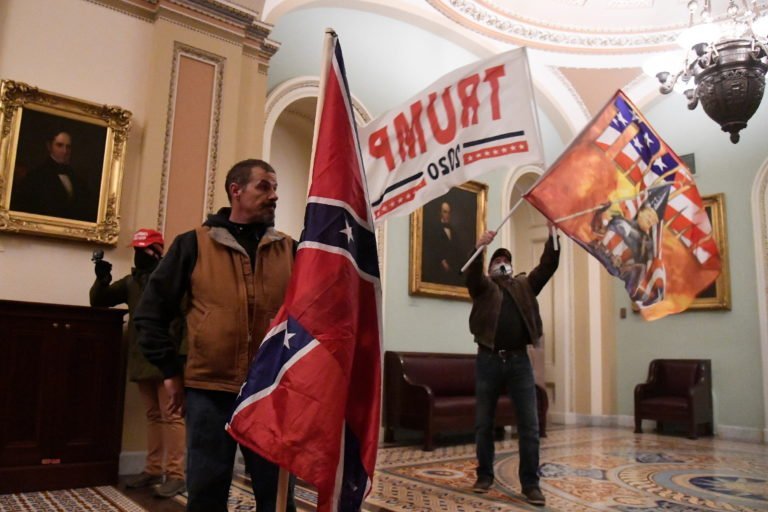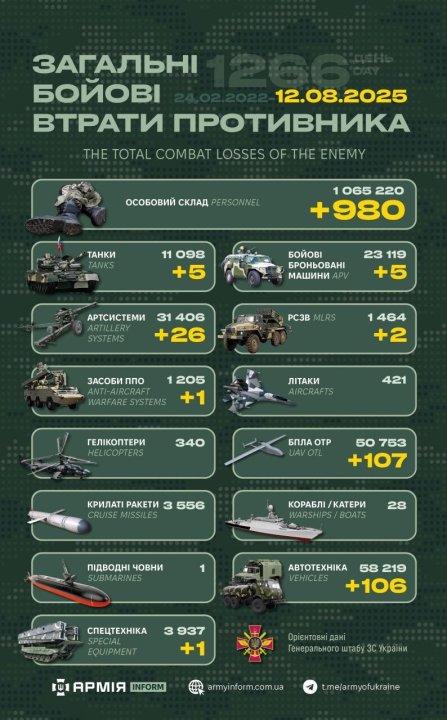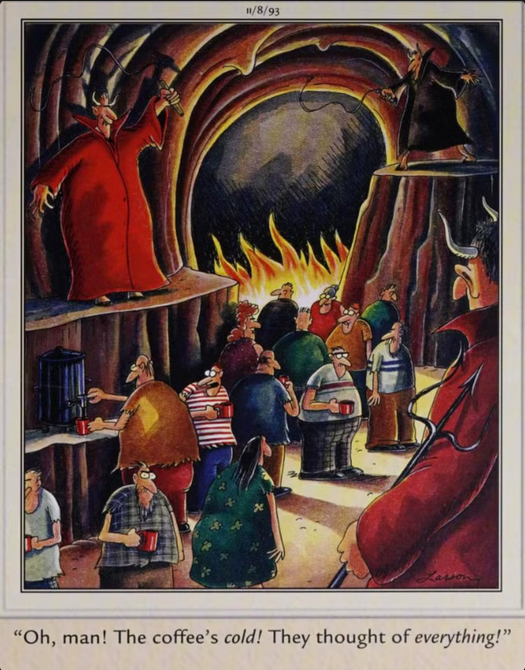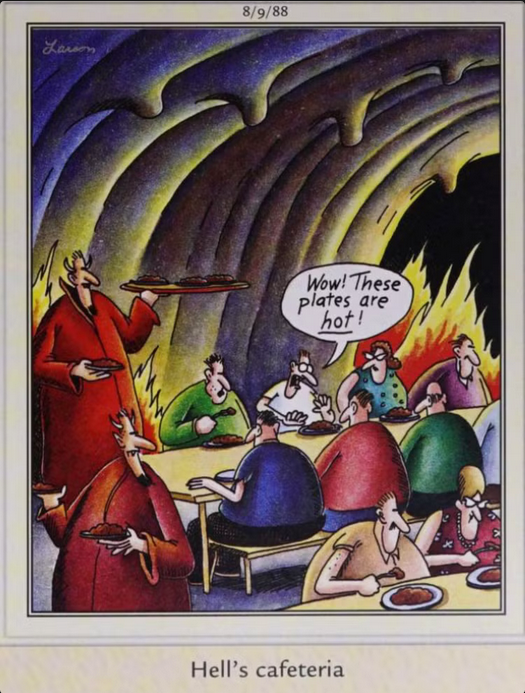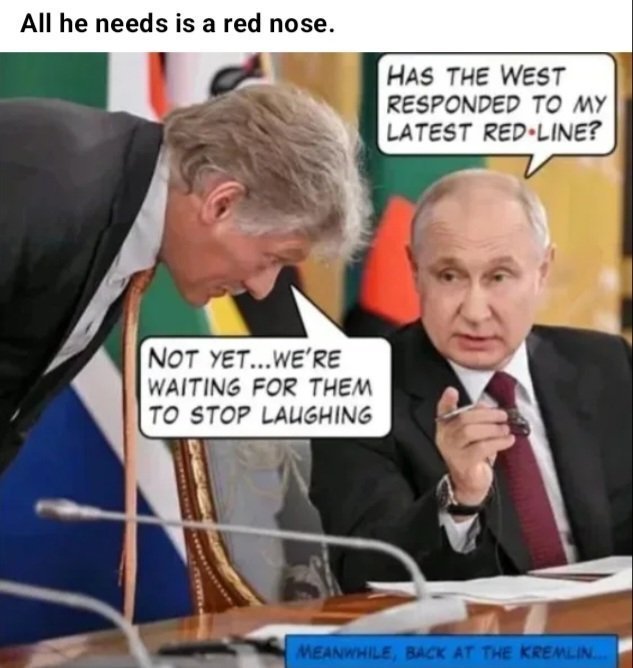Vinnerliste
Populært innhold
Viser innholdet med mest poeng fra 12. aug. 2025 i alle områder
-
https://x.com/GLandsbergis/status/1954974704730554876 Lenken kunne ikke bli inkludert fordi det er ingen tvitring på den URL-en. If Ukraine has no choice but to accept “de facto” occupation — that’s because WE failed. Not because Ukrainians failed, not because some mysterious “shit happened”, but because for years we ignored all the warnings, repeated all the mistakes of history, kicked the can down the road and refused to do what it takes to defend the rules and principles that enable sustainable peace and prosperity. This is on us. We are the architects of this de facto defeat, so now we are trying to pretend it came out of nowhere and we did the best we could to stop it. In a spectacular display of unbombed westsplaining, Mark Rutte is suggesting that everything will be OK in the long run, like it was OK in the Baltic States after decades of de facto occupation by jolly old Uncle Joe Stalin. Well, I have shrugged off a lot of dumb hot takes about my country over the last few years, but this one is literally sickening. Rutte is revealing that the latest genius 5D chess move to save Ukraine is to casually throw millions of people into a black hole of oppression, torture, rape, kidnapping, murder and destruction of national identity — “de facto, but not de jure”. And the proponents of this plan will keep a straight face while they cite the misery of the occupation of the Baltic States as a shining example that Ukraine should happily walk into. In his FT column, Gideon Rachman says little to fill the gap in Rutte’s world view: "The Soviet Union’s annexation of the Baltic states after 1940 was never legally recognised by the US and most European countries. But it was a fact of life, until, eventually, the Baltic states regained their independence." Yikes, let’s unpack that. The occupation wasn’t “a fact of life”, it was a fact of death. “Eventually” was after decades of deportations, killing, grinding terror and violent attempts to turn everybody into russians. “Regained their independence” was being crushed under Gorbachev’s tanks while western leaders pleaded with us to give up our fight for freedom. So… this is the path to peace we are supposed to offer to Ukraine with a smile? These are the glorious new security guarantees that will erase the shame of the Budapest Agreement and allow Ukrainians to have faith in the future? There are even US Ambassadors talking about how countries can “earn” certain territories and therefore presumably “deserve” them. Would it be paranoid of me to wonder if we just opened the door for Russia to “earn” Narva and Vilnius “de facto”? Han har rett. Det er EUROPA som må bære hovedansvaret for katastrofen som kan ha sett 1,5 mill. døde og skadde - en hel generasjon politikerne hadde overtatt ved år 2000, som vist seg å være så inkompetent at disse burde anklages for å være dummere enn loven tillater. Vi skulle ha reagere da Putin kom med trusler om å angripe andre land i 2007. Vi skulle ha opprettholdt utstengingen etter Sør-Ossetiakrigen i 2008. Vi skulle ha satt inn sanksjoner og militærsstøtte i 2014. Vi skulle ha opprustet med en gang allerede i sommeren 2021 da tydelige tegn på krigsforberedelsene var sett. Istedenfor hadde vi sett hvordan tid, ressurser og så mye annet blitt sløst bort. Det som Rutte kommer med er intet mindre enn feighet. Og fra EU er det mange som er helt fra seg av raseri da det kom fram at vi kan vente oss en energikrise uten sidestykke fordi politikerne ville ikke vurdere konsekvensene av "det grønne skiftet" og siden prøvd å hindre offentliggjøring av dette, fordi de er feige. "Kicked the can down the road"-øvelsen er noe politikerne i USA og EU hadde vært så flink med at de er blitt de reneste eksperter - slik at vi nå risikere total katastrofe i dette året og de etterfølgende årene. Og, de er også eksperter på å ignorere advarsler fra alle kanter!12 poeng
-
11 poeng
-
Når du trodde du hadde hørt det absolutte lavmålet som kan komme ut av munnen på Trump så slås du faktisk i bakken. Hvordan i he.... kunne USA velge denne mannen til president for andre gang?9 poeng
-
Du har allerede glemt at trump i sin forrige periode fikk brukt tåregass mot fredelige demonstranter fordi han ville posere med en bibel utenfor en kirke?9 poeng
-
Optimist 🙂 Utviklingen går mot at protester ikke vil bli tolerert i det hele tatt. Og er de fredelige i utgangspunktet, er det ingen problemer med å å utfordre folk på en slik måte at de ikke forblir fredelige. Derfra er det lett å tagge dem som kriminelt, voldelig opprør....og da vet vi hvordan det går. Dette så vi i California nylig, der politiet hadde styring på protestene (slik de skal ha), satte Trump inn militære og ting forverret seg fort.9 poeng
-
Som disse kartene viser; russerne vil ta den siste delen av Donbass ved å bryte gjennom nordøst for Pokrovsk og når Slovjansk-Kramatorsk området. Selv om de ukrainske F-16 flyene gjort sitt beste, er det ikke mulig for dem å hindre gjentatte angrep med upresise glidebomber som hamre ut hele områder, og ved å befeste seg i bebygde strøk risikere de ukrainske styrkene, som måtte gjøre sine frontavdelinger så usynlig som mulig ute på det åpne, at russerne vil omgå dem og tvinge dem på retrett. Det har nå hendt dusinvis av ganger at ukrainerne måtte forlate gode forsvarsposisjoner som ikke kunne holdes av frykt for omringning.8 poeng
-
https://www.msn.com/en-us/news/politics/by-sending-troops-to-d-c-and-eyeing-oakland-trump-continues-targeting-black-led-cities/ar-AA1KkAbS?ocid=hpmsn&cvid=3c0569fb241b454ded25f4c8193c1976&ei=13 Da jeg sa "hvitrasister", jeg MENER DET. Som da jeg sa Putin hadde tenkt å invadere Ukraina allerede i sommeren 2021. When President Donald Trump announced Monday that he will deploy National Guard troops to the streets of Washington D.C. to combat crime, he named several other cities where he might take similar action. "We have other cities also that are bad. Very bad," Trump said during the White House news conference. "You look at Chicago, how bad it is. You look at Los Angeles, how bad it is. We have other cities that are very bad. New York has a problem. And then you have, of course, Baltimore and Oakland. We don't even mention that anymore there." Trump and other members of his administration, while often using false or misleading statistics, have cited rampant crime as the justification for deploying federalized troops within U.S. cities. But these cities share another commonality: They're led by Black mayors. Critics don't think that's a coincidence. Trump's focus on Washington D.C., Chicago, Baltimore, New York and Oakland is part of a larger pattern in which the president has suggested cities with majority-Black populations, or those led by Black leaders, are hotbeds of crime and corruption and symbols of American decline. "I see this as a political dog whistle to his base, evoking long-running stereotypes that Black mayors cannot adequately govern or are soft on crime in their cities," said Jordie Davies, a professor of political science at UC Irvine. "Donald Trump is engaging in political theater so he can be seen as responding to the racist ideas that these cities are poorly run and overrun with crime - even as statistics demonstrate that violent crime in major U.S. cities, including D.C., is down this year." Reports of violent crimes - homicides, robberies, assaults and sexual abuse -have seen steep declines over the last two years, the Washington Post reported. "If he is going to start lying about major American cities to justify sending the military there, it is not surprising to me that he would pick cities with Black leadership and significant Black populations," state Sen. Scott Wiener, D-San Francisco, said Monday. "That is straight up Donald Trump's alley and straight out of his racist playbook." Crime is also falling in Oakland, a trend that Mayor Barbara Lee cited Monday in arguing that Trump was less interested in facts than in scoring "cheap political points by tearing down communities he doesn't understand." Oakland experienced a 6% increase in reported violent crimes in 2024, but saw a decrease in homicides and property crimes, according to a Chronicle analysis. So far in 2025, violent crimes including homicides are down significantly in the city. "We're making real progress on public safety in Oakland, and while we acknowledge we have more work to do, we are doing this work each and every day," Lee said. "Our comprehensive public safety strategy is working - crime rates are coming down even though we still face many challenges. And let me repeat, President Trump is wrong." Before Trump accepted the Republican presidential nomination at the Republican National Convention in Milwaukee last year, he reportedly called the city "horrible." "Trump is a lot of things but he certainly isn't subtle-all of the cities he denigrates have one important thing in common: they all have significant Black populations," DNC Chair Jaime Harrison said in a statement to the Daily Beast at the time. In 2020, Trump said of Detroit, Oakland and Baltimore, "these cities, it's like living in hell." "And everyone gets upset when I say it, they say, ‘Is that a racist statement? ' It's not a racist," Trump told Fox News. "Frankly, Black people come up to me, they say, ‘Thank you. Thank you sir for saying it.'" Davies, the UC Irvine professor, said using the fear of crime - especially the idea of "Black crime" - has always been an effective political message in the U.S. It was a message Trump hammered consistently in the 2024 election, a race in which he doubled his share of Black voters from 2020. (still, Trump's opponent, then-Vice President Kamala Harris, won 83% of Black voters.) "Crime evokes fear and fear provides a political vacuum that can be filled with state violence," Davies said. "It will be important for experts, politicians, and journalists to call out Trump's lies about crime in these places and name this for what it is: a racist attempt to dominate Black cities and a performance of power for his base." Det er på høyt tid å erklære at alle påstander og erklæringer om at Donald Trump er en rasist er helt korrekt, og at hans politikk er basert på hvitrasistiske kriterier. Vi ser mer og mer at det foregår raseprofilering mot minoritetsamerikanerne i regi av republikanerne og statsansatte som ICE - samtidig som hviterasistisk retorikk forsterke seg samtidig som den usanne retorikken om et "fargeblindt demokrati" - som i virkeligheten er for å knuse all motstand mot rasistisk politikk. En politikk som i tillegg forskjellsbehandle fargede etter disses formuer; jo mer penger man kan bruke for å betale i bestikkelse og beskyttelse, jo mer akseptert vil man bli mens alle andre utsettes for overtredelser - dette er ikke et nytt fenomen. Derfor ser man enkelte rike fargede i Trumps midte i det som ellers domineres av rasister. Som ventet hadde disse som stemte på Trump, angret på deres stemmer selv om det er klart at de lider av enorm forvirring i likhet med arbeidsklassefolk som ikke heller klare å fatte følgene av Trumps tollpolitikk, når disse utsettes for påvirkning av rike fargede som villig overstøye alle som ville komme med fornuftige motsigelser. Vi ser dette overalt hvor "betalte agenter" utnytte deres makt eller innflytelse for å demobilisere folk flest - en taktikk som demokratene aldri kunne forsvare seg mot, og dermed tapte sterkt på, selv når de er på den rette siden. Rasismen for første gang siden Wilsons dager har returnert til den føderale USA.7 poeng
-
Israelske jagerflypiloter planlegger en demonstrasjon i protest mot Netanyahus utvidelse av krigen og til støtte for IDFs stabssjef som er mot full okkupasjon av Gaza, skriver israelske medier. 'War must be stopped': Israeli fighter pilots to protest outside IDF's HQ, call for Gaza deal https://www.jpost.com/israel-news/article-863982 Pilots in active reserve service and former pilots from the Israel Air Force are expected to hold a quiet demonstration on Tuesday outside the Kirya (military headquarters) in protest of the government's decision to approve the plan to expand the fighting in Gaza despite the opposition of IDF Chief of Staff Eyal Zamir, who warned that the plan would endanger the lives of the hostages. The demonstration is expected to take place near the base's "Shaul" gate, near Hostage Square in the Tel Aviv Museum plaza. "The demonstration started from a very small initiative by a few former pilots and quickly gained momentum," a former veteran pilot who plans to participate in the protest told Walla. (...) "This is a demonstration of support for the chief of staff. Our message is simple. That he should stand by his principles in the spirit of the IDF against the government and not give in to political pressure. That he should not just go to war in Gaza. That soldiers should not just be killed. The war has exhausted itself. The demonstration will be very specific and will focus on the tension between the chief of staff and the government."7 poeng
-
USA blir mer og mer totalitært og autoritært. Det går nok veien mot borgerkrig tror jeg hvis ingen klarer å bli totalt kvitt Trump og hans følgere. Det er greit med litt moderat konservatisme, men den konservatismen som er i USA er helt ekstremt. Det er har kommet slik pga. dårlig utdannede folk, og religiøse fanatikere.7 poeng
-
Tybring Gjedde satt på Stortinget, finanskomiteen, og forsvarskomiteen, han var ingen lokalpolitiker. Nå er jeg uansett ferdig med å tolerere din stae uvitenhet.7 poeng
-
Situasjonen er ikke god, og har ikke vært det på lenge. Det ukrainske forsvaret er nå ikke-eksisterende fordi det ikke lenge er faste frontposter, stillinger eller holdepunkter å bemanne, det er nå bare små kampgrupper i midtetidige forsvarsposisjoner man forflytte seg mellom, med svære gap som gjør det mulig for infiltratører og små grupper å tvinge seg gjennom, men i ni av ti ganger stoppet de opp eller returnert fordi de kan ikke finne forsvarerne eller få inn forsterkninger. I den tiende gangen fortsatt de videre når de hadde bekreftet hvor forsvarsstyrkene befinner seg. Ukrainske motangrep har vist at det er liknende tilstand på russisk side, men de har langt flere menn dypere i egne rekker. Det gjør at russernes angrep bare fortsette og fortsette, etter sist nytt er Pokrovsk i ferd med å bli omringet og kuttet av fra resten av forsvarslinjen som nå strakk seg flere kilometer i dybde med usynlige stridspunkter. https://x.com/clashreport/status/1955002495052419425/photo/1 Lenket ikke mulig å vise. Mr. President, I sincerely don’t know what exactly is being reported to you, but I’m informing you: on the Pokrovsk – Kostiantynivka line, without exaggeration, it’s complete chaos. And this chaos has been growing for a long time, worsening with each passing day. The command structures currently being appointed (or already appointed) to “fix the unfixable” will most likely be blamed for the chaos that’s already unfolding. A stable line of combat contact, as such, effectively doesn’t exist. Pokrovsk and Myrnohrad are almost surrounded. Kostiantynivka is in a semi-encirclement. The enemy is advancing toward Kramatorsk and Druzhkivka. The problem has been escalating since last year. This was publicly warned about, and it has come to pass exactly as predicted. The cause of this problem isn’t the newly formed corps that inherited a disastrous situation with understaffed subordinate units, nor the OTU or OSUV, which for the past year and a half have effectively managed nothing, merely passing on orders “in accordance with directives from the General Staff.” The systemic problem began with the depletion of reserves, the widespread fragmentation of units across the entire front line, reports of “captured villages” being touted as victories amidst failures of entire sectors, the allocation of mobilization resources to “cronies,” and the complete lack of strategic or even operational vision of the theater of operations among parts of the military leadership. I am an officer, and I have a sense of dignity. My conscience is clear. Report concluded. To all the officers who have accepted the “rules of the game” – I don’t know what the hell to say to you. I don’t understand you. Assault regiments are scattered across the entire front line, just like absolutely all defense forces units. Perhaps this is a plan to "simplify" troop management that we cannot comprehend. Or it’s idiocy stemming from the fact that when you don’t know how to maneuver or think, the only solution to any problem you see is throwing in additional forces, pulling them from another direction. As a result, the entire front has turned into a "hodgepodge." I actually think there were some thoughts somewhere about turning the army into one unit with a million infantrymen and one commander. If orders from the general staff are coming to restore a position, then in reality, it’s not far from this. And in fact, there’s a high likelihood that this failure will start being hysterically patched up in the style of previous ones, which will worsen an already unrealistically shitty situation. It’s a fucking snowball effect that’s almost impossible to fix, but with each day it gets worse, and replacing the commander might, damn it, at least stop the deterioration. Because I really can’t imagine how this can be fixed. Dette fra en ukrainsk offiser som har fått nok. han har rett i det med at det er for mye oppmerksomhet mot det som hender på Sumyfronten og langs grensen mot Russland, at det overskygget resten av krigen - og faktumet om at de ukrainske styrkene er meget kraftig overstrekket. Så kraftig, at det trolig nå er mindre enn 200,000 kamptrente soldater tilbake mot tre ganger så mange - og av dette er over halvparten bundet ned uten å kunne forflyttes. Statistisk sett har Ukraina bare en firedel av alle sine kamptrente soldater som hadde blitt satt inn, i dag. Det må sies at den ukrainske militærledelsen hadde gjort sitt beste, men det er opplysninger om at de hadde vært sterkt hemmet av politisk innblanding og fraksjonsstrid samtidig som de sliter med at de aldri har nok offiserer - dette er noe som vi i Norge må trekke viktig lærdom av - slik at dette åpner for kvalitetsproblemer og disorganisasjon. Syrskyj er en upopulær mann med ganske gode meritter på seg som feltherre, men lider av det store problemet ved å være en ja-mann som stadig måtte "fikse" fremfor å planlegge og gjennomføre sine trekk på egen hånd. Det gjør at han alltid handle i ettertiden, og hans besluttsomhet som en "pusher" a la en britisk vestfront-general fra 1.vk var ofte hans eneste redning. Men det gjør at de kan ikke ha krefter til overs for egne styrker. Det gjør at mange militære føler seg forrådt, og sivilister er ved å slutte seg til den samme oppfatning. Syrskyj er Ukrainas Haig. Så langt er ukrainerne den tapende parten, de har ikke et forsvar på plass fordi de må usynliggjøre sine frontsoldatene som siden støttes med droner og artilleri, selv om fly med presisjonsvåpen gjør et voldsomt innhugg på russerne som ikke kunne sende sine fly mye nærmere pga. F-16 flyene som stadig patruljere på 100 km hold. Men russerne har ikke muligheter for å konsentrere sine styrker på mer enn kompaninivå, logistisk sett er det for lite, for mange offiserer er død, og organisasjonen er så oppløst at man må operere bokstavelig talt "individuelt". Dette var sett på Sumyfronten hvor hele regimenter og brigader regelrett bli lederløse og uorganiserte horder av dårlige trente og motiverte soldater med rådville offiserer. Det eneste de kan gjøre er å krype seg framover. Og de vinner på det.7 poeng
-
6 poeng
-
Hva er det som er så skrullete? Ellers ganske friskt å sammenligne MDG med et nynazist-parti…6 poeng
-
trump-ansatte som sier det var helt tilfeldig at dette skjedde samtidig kan vel ikke akkurat kalles en faktasjekk..? Og det var uansett en svært voldelig inngripen mot demonstranter basert på trumps misnøye med dem - som var poenget det ble svart på.6 poeng
-
Felles erklæring om Gaza, 22 vestlige land: Joint statement on the humanitarian situation in Gaza Nyhet | Dato: 12.08.2025 The humanitarian suffering in Gaza has reached unimaginable levels. Famine is unfolding before our eyes. Urgent action is needed now to halt and reverse starvation. Humanitarian space must be protected, and aid should never be politicised. Joint statement on behalf of 27 partners on aid to Gaza and restrictions facing NGOs. However, due to restrictive new registration requirements, essential international NGOs may be forced to leave the OPTs imminently which would worsen the humanitarian situation still further. We call on the government of Israel to provide authorisation for all international NGO aid shipments and to unblock essential humanitarian actors from operating. Immediate, permanent and concrete steps must be taken to facilitate safe, large-scale access for the UN, international NGOs and humanitarian partners. All crossings and routes must be used to allow a flood of aid into Gaza, including food, nutrition supplies, shelter, fuel, clean water, medicine and medical equipment. Lethal force must not be used at distribution sites, and civilians, humanitarians and medical workers must be protected. We are grateful to the US, Qatar and Egypt for their efforts in pushing for a ceasefire and pursuing peace. We need a ceasefire that can end the war, for hostages to be released and aid to enter Gaza by land unhindered. This statement has been signed by: The Foreign Ministers of Australia, Belgium, Canada, Cyprus, Denmark, Estonia, Finland, France, Greece, Iceland, Ireland, Japan, Lithuania, Luxembourg, Malta, the Netherlands, Norway, Portugal, Slovakia, Slovenia, Spain, Sweden, Switzerland and the UK. The EU High Representative for Foreign Affairs and Security Policy and Vice-President of the European Commission, the EU Commissioner for Equality, Preparedness and Crisis Management and the EU Commissioner for the Mediterranean. https://www.regjeringen.no/no/aktuelt/joint-statement-on-the-humanitarian-situation-in-gaza/id3115738/6 poeng
-
Be afraid. Be very afraid...... https://www.vg.no/nyheter/i/vgL8jl/the-post-trump-vil-opprette-militaer-enhet-for-aa-slaa-ned-protester6 poeng
-
Begynner å lure på om Trumps "trusler" mot putin bare er avtalt skuespill. -"Ta det helt med ro, kamerat putin. Jeg bare flytter litt på ubåtene mine så folket mitt skal tro at jeg har baller."6 poeng
-
Hvorfor? Hvorfor er det alltid sikkerhetsnettet som skal kuttes når man trenger penger? Det er nok av flesk rundt omkring i Norge som man kan skjære av.6 poeng
-
Og ved å henvise til deres partiprogram motsier du deg selv. Det står absolutt ingenting i Venstres partiprogram som tilsier at de ønsker "åpne grenser" eller "stiller ingen krav til innvandrere", slik du påstod.6 poeng
-
Strøm = kostnad Kostnader må dekkes av salgsprisen på produktet og kan være variable Er kostnader (meget) variable må bedrifter som ønsker å gå med overskudd ha en overhead/"worst case" tankegang Den høye (variable) strømprisen for produksjon og næring/utsalg blir dermed viderefakturert sluttbruker (dvs deg) Hva er det som er vanskelig å forstå her? edit: Eller mener du at all produksjon/næring (pølselaging i ditt eksempel) kun pågår når strømprisen er lav/lavest? Og mener du at det er kun kostnaden akkurat når pølsen blir laget/produsert som er påvirket av strømprisen? Eller er det hele verdikjeden fra bonden til slakteren til oppbevaringen til utsalgsstedet? Alle disse "stoppestedene" må betale OG viderefakturere for høy (variabel) strømpris, ofte på lange kontrakter frem i tid og er nødt til å ta i litt ekstra for å sikre at de ikke taper penger5 poeng
-
Hver gang jeg kommer over folk som er totalt uvitende om hva som er på vei, så anbefaler jeg litteratur om emnet. Ville du har vært interessert i noen boktips, sånn at du kan danne meningen din ut i fra hva som faktisk er tilfelle? Av en eller annen grunn leser klimabenektere aldri bøker.5 poeng
-
Tenk så mye dyrere det blir når det blir sult og massedød fordi hetebølger og flom dreper avlinger. Det blir dyrt det!5 poeng
-
Men hva med Secret Service som startet aksjonen før de skulle, årsaken til at de fredelige demonstrantene ble utsatt for plutselig og uprovosert vold uten forvarsel..?5 poeng
-
Mdg med liten makt er mye bedre enn listhaug med mye makt… mener jeg.5 poeng
-
Og så gjør du det igjen. Dette er den viktige biten: " reported that it was not known why U.S. Secret Service had deployed ahead of schedule, advancing on protesters before the Park Police had a chance to warn protesters to disperse." Trump sitt SS startet konflikten, på grunn av hans photo op.5 poeng
-
Fakta er; "A June 2021 Interior Department Inspector General review of U.S. Park Police actions found that Park Police did not clear protesters from Lafayette Park for Trump's visit to St. John's Church but as part of a plan to erect fencing.[15][16][17] The Park Police incident commander was reportedly stunned when Barr informed him of Trump's impending visit.[18] That report also confirmed the use of tear gas by D.C. Metropolitan Police, revealed Park Police did not request deployment of Bureau of Prisons to the park, and reported that it was not known why U.S. Secret Service had deployed ahead of schedule, advancing on protesters before the Park Police had a chance to warn protesters to disperse.[19][20][17]: 15 The report also indicated that Park Police commanders could not identify who gave the order to deploy.[17]" ... Så, kildekritikk er viktig @jallajall, så du ikke sprer misinformasjon.5 poeng
-
Det var da, og itte nå. Utviklingen går i høy fart mot diktatur og gravøl for folks rettigheter. Før eller senere vil det bli hardt mot hardt...ikke lett å være "fredfull" når du har mistet stemmeretten og/eller jobben, immigrant-kona de i 15 år har blitt deportert og 5-åringen din ikke lenger får støtte til sin livsnødvendige medisin. Optimisme er flott, det...men den bør være basert på noe litt mer lovende og positivt enn D. Trump.5 poeng
-
5 poeng
-
Det som er så vilt er at nesten hele det republikanske partiet bare forsetter å slikke han opp etter ryggen (og andre steder) til tross for at hans handlinger bare blir verre og verre. Er det virkelig så dårlig stilt med ryggradene deres?5 poeng
-
Tybring Gjedde har sittet på Stortinget siden første halvdel av 2000 tallet. Han er ingen kommunepolitiker. Du er uærlig, eller så sliter du med å holde enkle setninger i hodet, lenge nok til at du kan diskutere hva som faktisk blir sagt. Du utfordrer ingen ting. Du begår de mest grunnleggende feil. Synes du det er vanskelig å følge med? Jeg legger deg uansett til på ignore-lista, så du trenger ikke svare.5 poeng
-
Motorveiene blir vesentlig billigere om vi senker standarden litt. 4-felt bygget til 130-standard kan fint bygges som 4-felt til 100-standard. Ikke bare blir den billigere men naturinngrepene blir mindre også.5 poeng
-
5 poeng
-
Enda mer om denne saken. Modi er så sint at han har stoppet våpenavtaler og intensiverer leveranser av strategiske viktige varer som jetmotor og elektronikk for å bygge opp en reservekapasitet mot et mulig amerikansk-indisk brudd. Og det er mye som tyder på at hele konflikten skyldes ikke russisk olje, istedenfor finnes det indisier om at Trump hadde reagert ekstremt barnslig mot Modi som nektet å gi ham "æren" for at den indisk-pakistanske krigen stanses. https://www.msn.com/en-us/news/world/the-end-of-the-trump-modi-bromance/ar-AA1Khu6k?ocid=hpmsn&cvid=465276cb17b14a39ea94a2086928e84e&ei=69 When Indian Prime Minister Narendra Modi met President Donald Trump in the Oval Office in February, the Indian premier was in an exuberant mood at the prospect of a second Trump term. Trump was a man with whom Modi had formed a personal bond — or even better, a friendship. Did the two not share fond memories, Modi reminisced, of appearing together at the “Howdy Modi” rally in Texas in 2019, and of hosting another joint mega-event in Modi’s home state of Gujarat in 2020? In the coming years, would the two not advance the U.S.-India relationship with “the same warmth, the same trust, the same excitement”? Apparently not. On July 30, months into deadlocked negotiations for a U.S.-India trade deal, Trump posted on Truth Social that he would be slapping 25 percent tariffs on Indian imports. Not eight hours later, Trump added insult to injury by announcing a trade deal with Pakistan, India’s perennial rival, at a lower tariff rate of 19 percent. The tension escalated from there. Trump called India’s economy “dead” and warned last Monday that tariffs on India would be “substantially” raised. On Wednesday, the number was revealed: 50 percent, which would be one of the highest tariff rates imposed by the United States anywhere in the world. What accounts for this abrupt reversal? If Trump’s Truth Social posts are to be taken at face value, the tariffs punish India’s relationship with Russia: India imports significant amounts of Russian oil, and Indian manufacturers have shipped parts and weapons to Russia for use in the war in Ukraine. But Trump is apparently content to allow some nations to profit off Russia, as Indian officials have repeatedly argued. China, which buys more crude oil and oil products from Russia than India, was given an extension to negotiate a trade deal a day before Trump imposed the first round of punitive tariffs on India. Russia itself, for that matter, enjoys a luxurious 10 percent tariff rate. The India-Russia relationship has also historically played to U.S. interests, as my colleagues reported last week. In the early days of the war, European nations placed sanctions on the purchase of Russian oil. The only problem? Europe was still heavily dependent on Russian energy. With the tacit encouragement of the U.S., India bought Russian crude oil at cheap prices, processed it and exported it to European nations, thus helping Europe avoid directly violating its own financial sanctions against Russia. Having India buy Russian oil “satisfied multiple players in this game,” Ashley Tellis, a senior fellow at the Carnegie Endowment for International Peace, told me. But “all that now is ancient history, because we’ve changed our policy. What India did without penalty before has now become a source of consternation to this administration.” Beyond India-Russia relations, personal rancor is a possible factor in play. Trump took offense with New Delhi’s behavior in the aftermath of the India-Pakistan conflict in May, when India refused to acknowledge Trump’s role in mediating a ceasefire. Trump, gunning for the Nobel Peace Prize, has cited ending the India-Pakistan conflict as one of the reasons he deserves the award. “The way that entire India-Pakistan crisis ended left him with a rather sour taste, because he thought the Indians should have been grateful for his intervention,” Tellis said. “Instead, they ended up simply carping about his role. I think from that time onward, he just started to look at India in a somewhat different way.” Trump’s annoyance appears to have opened the door to anti-India sentiment from multiple quarters in the White House. For economic right-wingers such as Peter Navarro, Trump’s senior counselor for trade and manufacturing, long-held gripes about India’s protectionist economy and high trade barriers are finally seeing the light of day. And for the anti-immigration right — people including Stephen Miller, Trump’s deputy chief of staff — India is in the crosshairs as the largest beneficiary of the H-1B visa program, which offers skilled foreign workers a pathway to U.S. permanent residency. Domestically, the Modi government is caught between a rock and a hard place. New Delhi’s best hope out of punishing U.S. tariffs is to negotiate a trade deal, but to do so, Modi faces a difficult political balancing act back home. One of Washington’s main demands is to open the Indian market to U.S. agricultural crops and dairy products. But unfortunately for Modi, the country’s agriculture and dairy industries are the third rail of Indian politics: Any attempt to loosen the trade barriers protecting these two sectors is a surefire way to lose the next election. Farmers, who account for around 45 percent of India’s labor force, are a critical constituency for Modi’s Bharatiya Janata Party (BJP). As Maya Prakash noted in a recent Washington Post opinion piece, one of the few stinging defeats in Modi’s 11-year premiership came in 2020, when his government passed legislation that would have potentially reduced farmers’ earnings, leading agricultural workers to mount widespread protests across northern India. After 16 months of highway shutdowns and routs for the BJP in state-level elections, the government was forced to repeal the bills. Importing U.S. dairy — which may come from cows fed with animal-derived products such as tallow — is also a no-go for India, where an 80 percent Hindu population opposes animal-fed dairy on cultural grounds. Though the domestic Indian opposition is no fan of Trump — opposition leader Rahul Gandhi called the tariffs “economic blackmail” on Wednesday — they know to pounce if Modi budges on agriculture or dairy. The “government needs to stand up straight and demonstrate some spine against this coercion and bullying,” Manish Tewari, a member of the opposition Congress party, told Indian media Thursday. In the meantime, Modi will have to do his best to navigate tariff turbulence. During a rally on Aug. 2, Modi obliquely referred to the U.S. tariffs without mentioning Trump by name, exhorting his citizens to buy Indian-made goods “made with the sweat of the people of India” while unveiling a new slogan, “Vocal for Local.” But talk, especially defiant talk, is cheap in Indian politics. In 2020, after Chinese and Indian soldiers clashed in a deadly border dispute, Modi announced an initiative to boycott Chinese imports and build an “Atmanirbhar Bharat” — a self-reliant India. Even so, Indian imports from China surged from $65 billion in 2020 to $113 billion in 2024. In a similar vein, Modi may well have to eventually cave on the issue of Russian oil — less because Trump is profoundly concerned with India funding Russia and more to signal that New Delhi is willing to bend the knee. “My suspicion is that they will stop buying Russian oil progressively,” Tellis said. “But they will be very cagey about announcing that publicly, because if they do, then it will look like an unconditional surrender to Trump.” India will survive the tariffs, but they could slow the country’s GDP growth by a full percentage point, according to Indian media reports. Close U.S.-India relations, painstakingly forged over many decades, may not fare as well. When India gained independence in 1947, its first prime minister, Jawaharlal Nehru, championed the “nonaligned” movement, rejecting entry into the orbit of either the U.S. or the Soviet Union. Nearly eight decades later, India remains true to its nonalignment ethos in certain respects: It is both part of the Quad, an informal grouping with the U.S., Japan and Australia to counter China in the Indo-Pacific, and BRICS, a geopolitical bloc that includes China. Since 2008, however, when the U.S. and India signed a landmark deal to cooperate on civil nuclear energy, successive administrations in the White House have pried India away from its traditional posture — which always seemed closer to Moscow than Washington — and toward the U.S. in the hopes that India could act as a bulwark against China. So important was cooperating against China that the U.S. was willing to separate economic and strategic relations with India: Policymakers in Washington prevented unresolved disagreements over protectionism or intellectual property from getting in the way of advancing defense sales and intelligence sharing. Meanwhile, the Modi government reciprocated by embracing the American right, going so far as to have Ram Madhav, the national general secretary of the BJP, speak at a forum affiliated with the U.S.-based Conservative Political Action Conference. But Trump has so far evinced little concern for great-power strategic competition with China, at least where India is concerned. That has freed the U.S. president to demand that India choose between its defense interests and its protectionist idiosyncrasies. Trump’s India strategy “is really incomprehensible,” Tellis said. “This may turn out to be another one of those very costly whims of the president that the country will ultimately end up paying for.” The possibility of returning to a prelapsarian Trump-Modi bromance is now fast fading. India has instead dug its heels into its relationships with Russia and China: Modi sent his national security adviser to Moscow on Wednesday and said he would visit China in early September for the first time in seven years. “I may have to pay a very heavy price personally” for refusing to cave to Trump, Modi said at a public event Friday. “But I am prepared for it.” Trump risikere å ødelegge det som Bush junior og Obama hadde arbeidet med om å trekke India nær USA, og som Modi hadde brukt som grunnlag for å skape et nært forhold med Trump siden 2017 under ideen om å motarbeide den kinesiske innflytelsen. Dessuten burde det sies at Modi, tross økt indisk-kinesisk handel, hadde utmerket seg for hans evne for å motarbeide den kinesiske innflytelsen - selv om han gjort to fatale feil; annekteringen av Kashmir tilspisset konfliktene med både Pakistan og Kina og Trump selv; han hadde prøvd å få Trump til å omgjøre Afghanistanpolitikken uten å lykkes, og endt opp med å miste Afghanistan i 2021. Dette hadde Modi tilsynelatende glemt da han gratulerte Trump med seieren i november 2024, bare for å få et knyttneve rett i ansiktet i juli 2025. Det indiske jordbruksmarkedet som er gigantisk, domineres av en politisk sterk og kollektivistisk bondebefolkning som i flere indiske delstater flørte med "bondekommunisme" (det er kommunistisk styre i minst en indisk delstat!) som intet føderal parti kunne våge å gi seg i kast med, langt mindre BJP som basere mye av sin politikk på hindunasjonalistisk identitet som er knyttet til det rurale landsbyidealet hvorfra mye av den hinduistiske religionen deriblant kastesystemet har sin opprinnelse. Alle makthavere i Indias historie - og Gandhi selv - var helt innforstått med dette. De vet den egentlige politiske makten i India ligger i jordbrukssamfunnets ressursene. Dette nekter Trump å forstå. Han nekter dessuten å forstå den indiske balansegangen som alliansefri makt også på det økonomiske feltet, og ser ut til å tro han kan fritt diktere inderne etter egen valg. Hans behandling av Modi hadde utvilsomt fått mange til å tenke seg om, som bare styrkes med de helt ubegripelige tollsatsene mot Sveits som ifølge interne kilder skyldes Trump selv, som "misliker den sveitsiske statsministeren" uten forklaring. I Tokyo og Seoul snakkes det nå om "galningen i det hvite huset" i voksende raseri, de bare kan ikke bryte med USA, men de kom ikke noe vei med republikanerne i kongressen som nektet å motta kontakt fra utenlandet. Selv om de kom fra nære venner i EU-land. Og kineserne viser nok en gang at motstand lønner seg; Trump nok en gang utsatte tollkrigen mot Kina med nye 90 dager - og viser for alle at at det er rå makt som bestemmer. Selv om Xi nå systematisk går inn for å redusere den kinesiske avhengigheten av amerikanske varer og tjenester, han har forbudt kinesiske selskaper fra å kjøpe brikker/chips produsert av NVIDIA og ADM, så innmaten i kinesiske smarttelefoner og datamaskiner vil bli mer ikke-amerikansk.5 poeng
-
https://www.msn.com/en-us/news/politics/the-supreme-court-is-determined-to-turn-voting-into-a-limited-privilege/ar-AA1KkB01?ocid=hpmsn&cvid=c005097fa2964494dc7d186a17bc8609&ei=20 Troen på den føderale høyesteretten er nå bokstavelig talt på bunn, selv konservative reagert på Roberts politisering av høyesteretten som nå er så seriøst ut av ledd med resten av rettsinstansene at det vekker kraftig kritikk og protester som ennå så langt ikke kom videre fordi ved en feil hadde Roberts fått for mye makt. Det gjør at mange optimistiske legale eksperter som sier "det kan ikke skje", måtte irettesettes av sine kolleger fordi hver gang man sa "det vil ikke skje", hendt det akkurat som fryktet - for hender på en mann som ikke bryr seg om konsekvensene. Og nå er det allmenn frykt for at Roberts vil ødelegge stemmeretten for det amerikanske folket, ved å utnytte faktumet om at konstitusjonen har ingenting om demokrati, stemmerett eller folkelig medbestemmelse. In the United States, our ability to vote is supposed to be protected by law. But on the Voting Rights Act’s 60th anniversary, that law is being eviscerated to stop voters and their lawyers from defending that freedom in court. Our courts are a modern-day public square, where anyone is supposedly able to confront injustice, hold the powerful accountable, and defend their rights. For generations, courts helped ensure equal access to the ballot, striking down racial gerrymanders and discriminatory voting laws. But now, that public square is being fenced off—and in some places, it feels like a permanent wall is going up. The most consequential blow came in 2013, when the Supreme Court gutted the Voting Rights Act in Shelby County v. Holder, effectively ending preclearance, which required states and localities with histories of discrimination to seek federal approval before changing voting laws. Writing for the majority, Chief Justice John Roberts claimed the “blight of racial discrimination in voting” had been largely cured, a conclusion many called dangerously premature. As Justice Ruth Bader Ginsburg warned in dissent, ending preclearance was like “throwing away your umbrella in a rainstorm because you are not getting wet.” Now, with Section 5 preclearance gone, the court is moving closer to gutting another critical piece of the VRA, with two lines of attack in play. One target, which has drawn increased attention over the past two years, is the ability of private actors to use the VRA to challenge racially motivated practices that suppress the vote. If the court endorses the view adopted by the 8th Circuit, only the Department of Justice will be able to bring cases under Section 2 of the VRA. But the court has also seized upon a second path to dismantle the VRA even more resoundingly. In a case slated for the October 2025 term, the court issued an after-hours order just last week—on the eve of the VRA’s 60th anniversary—signaling plans to deliberate the constitutionality of Section 2 and its continued viability. Meanwhile, Donald Trump’s DOJ has shown no interest in enforcing voting rights; it has removed career attorneys in the Voting Rights Section, backed away from key cases, and even floated prosecutions of election officials, straight from the Project 2025 playbook. As courts become harder to access, the executive branch is compounding the threat—backing Trump’s executive order targeting independent election systems and promoting the dangerous SAVE Act, which is now pending in the U.S. Senate. These proposals would force Americans to produce specific government documents just to register to vote—an uphill climb for tens of millions who lack access to those papers but are still trying to exercise their rights, even as courts become less willing to hear their claims. All in the name of stopping “voter fraud” that does not exist in this country at any meaningful level. Even before these proposals, courts had made it harder for individuals and civil rights groups to challenge discriminatory voting laws. When it becomes difficult to find a lawyer—and nearly impossible to win in court—bad actors are left free to suppress votes without fear of consequences. The danger is greater with Big Law firms under attack from the administration. No lawyer can miss the message: If you take cases this administration doesn’t like, such as those in defense of voting rights, your livelihood could be next. Over two decades, as the Supreme Court dismantled the VRA case by case, voter suppression has evolved. It’s become administrative—built on paperwork, confusion, inconvenience, and ever-changing rules. Americans now jump through a growing number of hoops just to vote. While it may not be as blatant as being required to guess the correct number of jelly beans in a jar, the toll is corrosive just the same. The Supreme Court has hollowed out the VRA, stripping away the core protections Congress once put in place to defend the right to vote. With every new judicial decision, anti-voter policy has gained ground. Within 24 hours of Shelby County v. Holder, Texas reinstated a strict photo ID law previously blocked for targeting Black and Latino voters. Two months later, North Carolina passed a law that cut early voting by a week, ended same-day registration, and imposed strict ID rules—later struck down for targeting Black voters “with almost surgical precision.” Then in Brnovich v. DNC, the court made it even harder to prove that a voting law discriminates based on race. The ruling gave states broad leeway to pass restrictive laws, even those that disproportionately harm voters of color, as long as they could claim to be “preserving the integrity of its election process.” It was a significant blow to Section 2 of the VRA, the main tool left to fight voter suppression in court. Georgia Secretary of State Brad Raffensperger cited the Brnovich ruling to justify SB 202, an “omnibus voter suppression” law passed after Trump lost the 2020 election. Since then, data has shown the law disproportionately impacts Black voters—the same kind of discriminatory effect Brnovich made harder to challenge in court by weakening Section 2, coming from the same kind of law that would have been halted had Section 5 preclearance not been destroyed in Shelby. Raffensperger is currently overseeing a purge of nearly 500,000 voters, one of the largest in U.S. history. New analysis shows that when likely out-of-state movers are removed from the rolls, Black voters are overrepresented—raising familiar alarms about discrimination that today’s gutted legal tools can barely address. Now, that weakened tool faces an even greater threat. In May of this year, a federal appeals court ruled for the second time that only the U.S. attorney general—not private citizens or civil rights groups—can bring Section 2 lawsuits. The decision applies across seven states and would block most VRA enforcement where the DOJ declines to act. The court could be poised to go further and take that decision nationwide, leaving only the DOJ to sue to protect voting rights, hardly a priority in this and other Republican administrations. Sixty years after the VRA was signed into law, the Supreme Court seems intent on ignoring history—and dismantling the public’s ability to use it to defend their right to vote. The John Lewis Voting Rights Act, reintroduced by Sen. Raphael Warnock, wouldn’t undo all the damage done by the Supreme Court. But it would renew the promise of the VRA, restoring preclearance, stopping voter purges for inactivity, and ensuring people can still seek justice in court. Ultimately, we’re in an era where the burden of protecting democracy is falling on individuals. That’s not how it should be. Voting is a right, not a privilege or a test of endurance. Yet on the 60th anniversary of the Voting Rights Act—a law meant to stop Jim Crow at the courthouse door—we’re inching back toward an era where justice is out of reach for those who need it most. Roberts støttes av republikanerne som kom med massiv løgner om "fargefri demokrati" og "rasediskriminering er rasistisk mot de hvite" selv om minoritetsamerikanerne uten unntak nektet å støtte disse meget farefulle nazistiske ideer som bare de hvite fremme - og som bare republikanerne aktivt tar opp. De vil ikke erkjenne at rasismeproblemet har ikke minsket i de siste femti år og at de selv er rasister som lyver for alle i deres mål om å ødelegge alle rettigheter for de som "ikke passe inn" - fattige, hjemløse, fargede, skjevøynede, etc. - og fatter ikke at de gjør en borgerkrig uunngåelig.5 poeng
-
Trumps galskap bli bare verre og verre. Så ille at mange nå forstå at han er helt utilgjengelig også i møte med "venner" som oppdaget de kunne ikke stole på en så impulsiv og destruktiv mann som ingen har vært i stand til å kontrollere utover å avsette ham og sette ham i fengsel eller sinnssykehus. Han påstår "Russland alltid vinne sine kriger" - en historisk usannhet - og antyder sterkt at Ukraina må gi fra seg landområder for godt. Zelenskyj tvinges til å erkjenne at dette kan bli realitet. Uansett er det klart for alle at Trump ivret sterkt med å få Putin inn i varmen og skape en amerikansk-russisk allianse - trolig for å virkeliggjøre hans drøm om et hvitrasistisk herredømme over hele verden. Trump bryr seg ikke om konsekvensene av hans handlinger.5 poeng
-
Parlamentvalgte EU-politikere fra andre land vil nok neppe bry seg om Norge, med mindre det gagner deres land som de representerer. Det er de norske valgte politikerne til EU-parlamentet som må jobbe for norske interesser i EU, dersom Norge hadde blitt medlem. Norge ville fått rundt 14 representanter i EU-parlamentet dersom vi hadde vært medlem. Dette er omtrent det samme antallet som Danmark og Finland har.5 poeng
-
5 poeng
-
Trump avslørt, ikke uventet, at han aktet å innføre føderal styre i Washington D.C. - det sies ikke høyt, men han tvunget hovedstadspolitiet til å underligge seg National Park-politiet, som er forresten dypt kontroversielt etter en rekke saker; og sette inn nasjonalgarden, minst 800 soldater. For fra det hvite huset er det tydelige signaler om at Trump kan begynte å se på hovedstaden som "hans" by, og vil dermed foreta en ekte fascistiskinspirert "opprydning" ved å fjerne de hjemløse og slå ned på all kriminalitet - ekte som forestilt. Helt presist hva Hitler hadde gjort etter hans maktovertagelse. For man vil avskaffe Hone Rule Act 1973-loven, og dette har bare kongressen myndighet til å gjøre. Men det trenges et flertall, og dette har republikanerne ikke, så mange forstår ikke dette. https://www.msn.com/en-us/money/other/donald-trump-s-chip-revenue-deal-comes-under-scrutiny/ar-AA1Kkia2?ocid=hpmsn&cvid=8b14b5a6678c4a8585a68bccf831a06f&ei=46 Dessuten har nyheten om at NVIDIA og AMD hadde gi fra seg 15 % av sine inntektene i bytte mot eksporttillatelse til Kina slått ned som en bombe i den etablerte USA, som øyeblikkelig realisert at denne "enigheten" som Trump hadde presset på, er i klar konflikt med amerikansk lov - og spesielt med frihandelsprinsippet. For det er et meget strengt konstitusjonelt vedtak om at all eksportskatt eller skattlegging på all eksport ut av USA er 100 % forbudt. "In addition to the Constitution, 50 USC 4815(c) expressly prohibits fees for export control licenses. 'Fees-No fee may be charged in connection with the submission, processing, or consideration of any application for a license...' This is from the 2018 Export Control Reform Act." Hvordan Trump kunne tro dette kan iverksettes når grunnlovsfedrene hadde svært presist sagt er forbudt, de hadde vært frihandelstilhengere og deretter generelt opptatt av markedsbeskyttelse som færrest mulig restriksjoner på økonomisk utskipning da de amerikanske koloniene egentlig var eksportørnasjoner den gang, er vanskelig å begripe. Spesielt når det smaker av korrupsjon og statlig inngrep, et tabu som har vært stående gjennom USAs historie. https://www.msn.com/en-us/news/world/the-u-s-marches-toward-state-capitalism-with-american-characteristics/ar-AA1KibTC?ocid=hpmsn&cvid=37b31a8b0c724053af49d451ba64217c&ei=62 Statskapitalisme. Dette er hva Trump aktet å innføre. The U.S. Marches Toward State Capitalism With American Characteristics A generation ago conventional wisdom held that as China liberalized, its economy would come to resemble America’s. Instead, capitalism in America is starting to look like China. Recent examples include President Trump’s demand that Intel’s chief executive resign; the 15% of certain chip sales to China that Nvidia and Advanced Micro Devices will share with Washington; the “golden share” Washington will get in U.S. Steel as a condition of Nippon Steel’s takeover; and the $1.5 trillion of promised investment from trading partners Trump plans to personally direct. This isn’t socialism, in which the state owns the means of production. It is more like state capitalism, a hybrid between socialism and capitalism in which the state guides the decisions of nominally private enterprises. China calls its hybrid “socialism with Chinese characteristics.” The U.S. hasn’t gone as far as China or even milder practitioners of state capitalism such as Russia, Brazil and, at times, France. So call this variant “state capitalism with American characteristics.” It is still a sea change from the free market ethos the U.S. once embodied. How we learned to love state capitalism We wouldn’t be dabbling with state capitalism if not for the public’s and both parties’ belief that free-market capitalism wasn’t working. That system encouraged profit-maximizing CEOs to move production abroad. The result was a shrunken manufacturing workforce, dependence on China for vital products such as critical minerals, and underinvestment in the industries of the future such as clean energy and semiconductors. The federal government has often waded into the corporate world. It commandeered production during World War II and, under the Defense Production Act, emergencies such as the Covid-19 pandemic. It bailed out banks and car companies during the 2007-09 financial crisis. Those, however, were temporary expedients. Former President Joe Biden went further, seeking to shape the actual structure of industry. His Inflation Reduction Act authorized $400 billion in clean-energy loans. The Chips and Science Act earmarked $39 billion in subsidies for domestic semiconductor manufacturing. Of that, $8.5 billion went to Intel, giving Trump leverage to demand the removal of its CEO over past ties to China. (Intel so far has refused.) Biden overrode U.S. Steel’s management and shareholders to block Nippon Steel’s takeover, though his staff saw no national-security risk. Trump reversed that veto while extracting the “golden share” that he can use to influence the company’s decisions. In design and name it mimics the golden shares that private Chinese companies must issue to the CCP Biden officials had mulled a sovereign-wealth fund to finance strategically important but commercially risky projects such as in critical minerals, which China dominates. Last month, Trump’s Department of Defense said it would take a 15% stake in MP Materials, a miner of critical minerals. Many in the West admire China for its ability to turbocharge growth through massive feats of infrastructure building, scientific advance and promotion of favored industries. American efforts are often bogged down amid the checks, balances and compromises of pluralistic democracy. In his forthcoming book, “Breakneck: China’s Quest to Engineer the Future,” author Dan Wang writes: “China is an engineering state, building big at breakneck speed, in contrast to the United States’ lawyerly society, blocking everything it can, good and bad.” To admirers, Trump’s appeal is his willingness to bulldoze those lawyerly obstacles. He has imposed tariffs on an array of countries and sectors, seizing authority that is supposed to belong to Congress. He extracted $1.5 trillion in investment pledges from Japan, the European Union and South Korea that he claims he will personally direct, though no legal mechanism for doing so appears to exist. (Those pledges are already in dispute.) Trouble with state capitalism There are reasons state capitalism never caught on before. The state can’t allocate capital more efficiently than private markets. Distortions, waste and cronyism typically follow. Russia, Brazil and France have grown much more slowly than the U.S. Chinese state capitalism isn’t the success story it seems. Barry Naughton of the University of California, San Diego has documented how China’s rapid growth since 1979 has come from market sources, not the state. As Chinese leader Xi Jinping has reimposed state control, growth has slowed. China is awash with savings, but the state wastes much of it. From steel to vehicles, excess capacity leads to plummeting prices and profits. The U.S. hasn’t fared any better. Interventions made in the name of national security or kick-starting infant industries lead to boondoggles like Foxconn’s promised factory in Wisconsin or Tesla’s solar-panel factory in Buffalo, N.Y. State capitalism is an all-of-society affair in China, directed from Beijing via millions of cadres in local governments and company boardrooms. In the U.S., it consists largely of Oval Office announcements lacking any policy or institutional framework. “The core characteristic of China’s state capitalism is discipline, and Trump is the complete opposite of that,” Wang said in an interview. Means of control State capitalism is a means of political, not just economic, control. Xi ruthlessly deploys economic levers to crush any challenge to party primacy. In 2020, Alibaba co-founder Jack Ma, arguably the country’s most famous business leader, criticized Chinese regulators for stifling financial innovation. Retaliation was swift. Regulators canceled the initial public offering of Ma’s financial company, Ant Group, and eventually fined it $2.8 billion for anticompetitive behavior. Ma briefly disappeared from public view. Trump has similarly deployed executive orders and regulatory powers against media companies, banks, law firms and other companies he believes oppose him, while rewarding executives who align themselves with his priorities. In Trump’s first term, CEOs routinely spoke out when they disagreed with his policies such as on immigration and trade. Now, they shower him with donations and praise, or are mostly silent. Trump is also seeking political control over agencies that have long operated at arm’s length from the White House, such as the Bureau of Labor Statistics and the Federal Reserve. That, too, has echoes of China where the bureaucracy is fully subordinate to the ruling party. Trump has long admired the control Xi exercises over his country, but there are, in theory, limits to how far he can emulate him. American democracy constrains the state through an independent judiciary, free speech, due process and the diffusion of power among multiple levels and branches of government. How far state capitalism ultimately displaces free-market capitalism in the U.S. depends on how well those checks and balances hold up. Statskapitalismen er ikke ukjent i Norge - den, aktuelt, har vært og er dels hovedregelen fra meget gammelt av innenfor norsk økonomi hvor staten og privatkrefter samarbeidet eller samvirket for begges interesser - men det forutså ansvarlighet og legale restriksjoner på statsinngrep som private foretaksomhet ettersom det er massevis av historier om hvordan rivaliserende krefter kunne skape uoversiktlige og ødeleggende situasjoner der stat vers privat tilspisses. Det også åpne opp for maktmisbruk, inkompetanse og korrupsjon om det ikke er felles spilleregler - og dette hadde Xi valgt å ignorere som artikkelen forklart, med alvorlige følger for den kinesiske økonomiveksten. Det er Xi alene som er ansvarlig for at kinesiske varer selges på dumpingpris overalt fordi han nektet å la konsernlederne kutte og bremse ned tidsnok. Trump aktet å undertvinge seg den amerikanske nasjonaløkonomien, og alle disse lovnader om 1,5 trill. dollar fra utenlandet bunnet i hans ønske om å kontrollere disse pengene. For det var sett under den første presidentperioden at Trump tror på kommandoøkonomiske prinsipper i kontrast til amerikansk tradisjon. Som var aktuelt noe av det som amerikanerne gjort opprør mot da parlamentet i London ville kommandere kolonienes økonomiske virksomhet i tillegg til å ville beskatte uten representanter. https://www.msn.com/en-us/news/politics/president-trump-says-other-us-cities-could-be-next-as-he-deploys-national-guard-to-dc/ar-AA1KkbqX?ocid=hpmsn&cvid=a51bbfab093c466d88ae98c904be26d1&ei=60 Og i slutten vil han sende ut nasjonalgardister i andre byer, som gjør at mange som hadde advart mot føderaliseringen av D.C. var i meningen om at dette er en "prøvekult" for å sabotere den amerikanske føderasjonen med utstrakt lokalstyre fra delstatsnivå nedover. Trump singled out New York City, Los Angeles, Baltimore, Chicago and Oakland, California during a Monday, Aug. 11, news conference as potential future targets in what would be a drastic escalation of federal presence on the streets of American cities. "We're not going to lose our cities over this. This will go further. We're starting very strongly with D.C., and we're going to clean it up real quick," Trump said. Det blir bare verre og verre.5 poeng
-
Det står nok bedre til med den enn med både virkelighetsforståelsen din, og hvordan du forstår historien ut i fra den, desverre. Sterk stat, diktatur... ...du er så nær, men akk så fjern. Er Marine Le Pen kommunist..? Nei? Hvorfor får hun støtte fra Putin? Er AfD kommunister? Nei? Hvorfor er de drømmepartiet til Putin? Er Republikanerene i USA kommunister? Nei? Hvorfor får de Putin sin støtte -- og hvorfor får de lengst i autoritær og konservativ retning mest støtte gjennom propaganda? Konservative nasjonalister er de mest trolige å få støtte fra Russland og russisk propaganda. Hvorfor? --- Hvor plasserer du Belarus, Ungarn og Tyrkia -- og hvorfor?5 poeng
-
De kommer nok til å gi støtte til FrP, i og med at de har en realistisk sjanse til å påvirke valget i deres favør. De matcher i stor grad propagandaen Russland kjører ovenfor vesten; Kritisk til innvandring, kritisk til LGBTQ, EU-fiendtlig, vitenskapsfiendtlig (klima), tilbøyelig til moralsk korrupsjon fremfor å opptre etisk (de scorer lavt på ærlighet og rederlighet), er kritisk til seriøse medier, er et parti som appelerer til dem som hører på og som selv benytter seg av høyrepopulistisk retorikk som blant annet kommer ut av Russland -- et parti hvis hovedopposisjon er fra utdannede, som gjør dem til et parti som tjener på at færre tar utdannelse og på å senke kvaliteten på folkets generelle utdannelse og å sabotere folk sin virkelighetsforståelse. FOR kommer til å bli pushet, men FrP er nyttige i form av å gi dem mest valuta for propagandaen.5 poeng
-
Tybring Gjedde før han ble ekskludert. Som jeg skrev, ledelsen er nå sanert. Men grasrota har potensialet så lenge de kan «owne libs». Kornprise Velle er en fremtidig trump-skikkelse.4 poeng
-
"I was a little bothered by the fact that Zelenskyy was saying I have to get constitutional approval. He has approval to go to war and kill everybody, " says Trump, completely ignoring the fact that russia invaded Ukraine4 poeng
-
Lol. Si meg hva er FRP sin holdning til fri flyt av arbeidskraft over grensene og fri rett til å gjøre det man vil med sin egen kropp? To helt essensielle elementer i liberalisme.4 poeng





